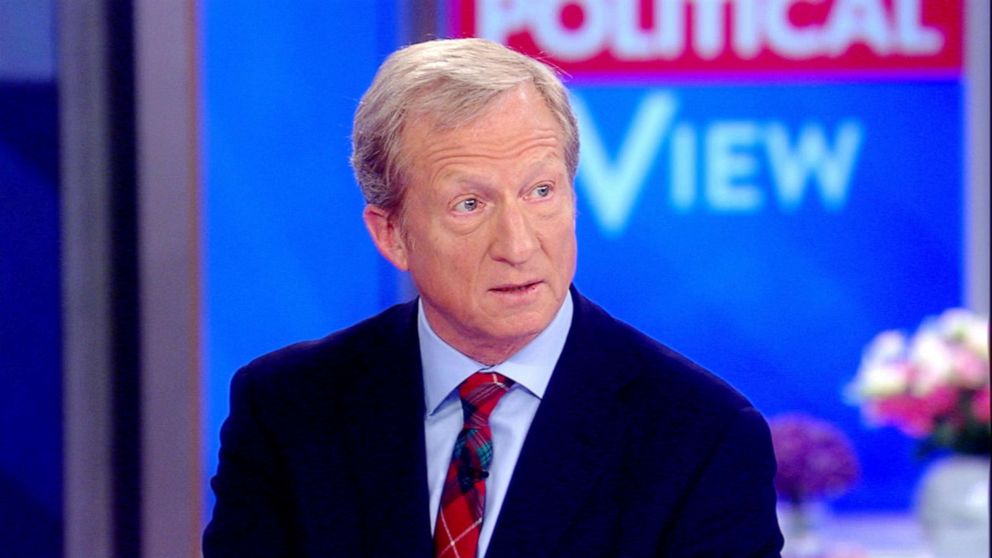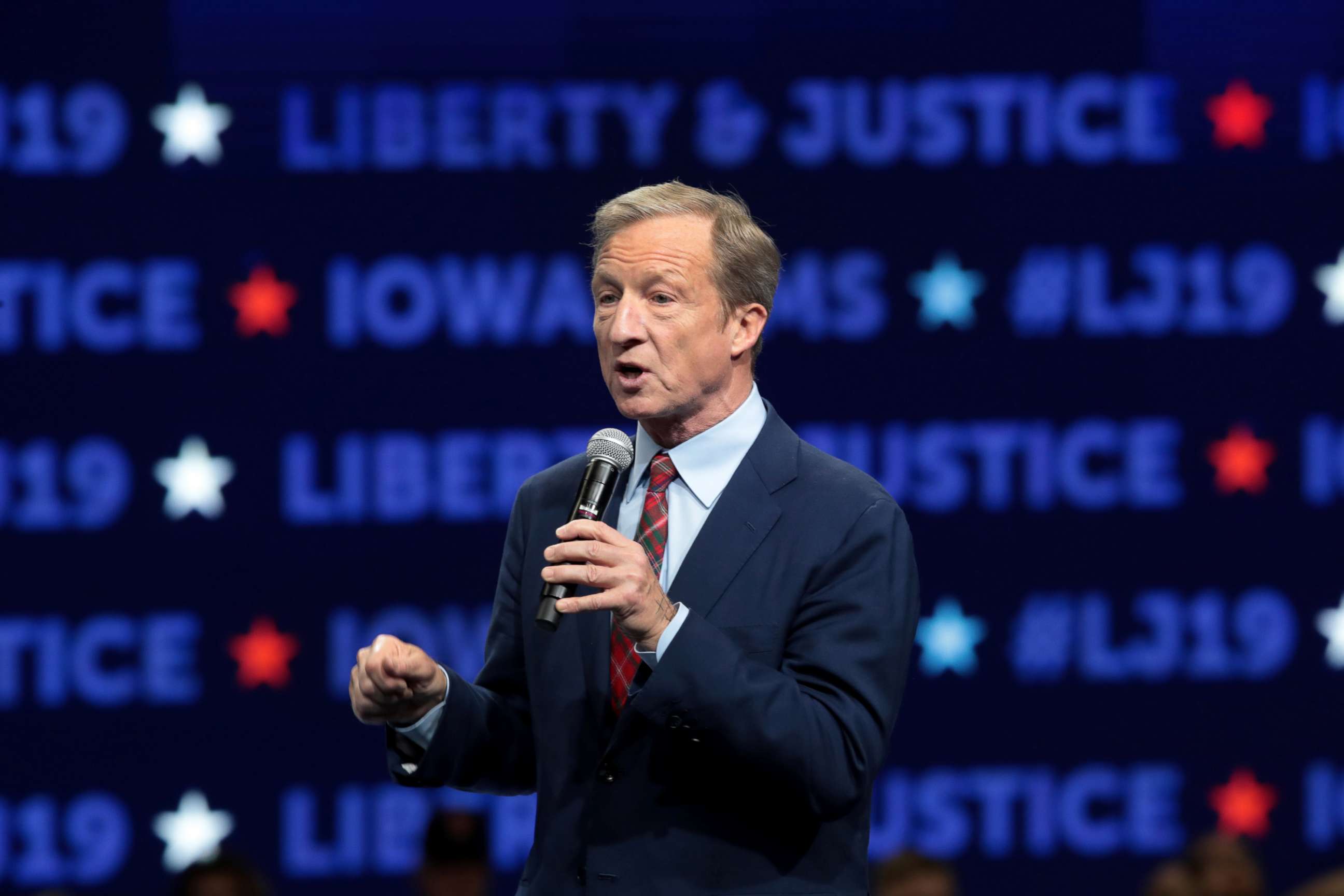Tom Steyer's Iowa campaign political director denies allegations of offering money for endorsements
The Iowa political director will keep his post on the campaign.
2020 presidential hopeful Tom Steyer’s campaign denied that its Iowa political director offered local legislators campaign contributions in return for endorsing Steyer, responding to a report from the Associated Press Thursday, and said the political director will keep his post on the campaign.
“Our campaign policy is clear that we will not engage in this kind of activity, and anyone who does is not speaking for the campaign or does not know our policy,” said Alberto Lammers, Steyer’s national press secretary.
Lammers said they are “not seeking any disciplinary action at this time.”
Multiple current and former Iowa state legislators told the AP, which first reported the story, that they had conversations with Steyer’s current political director in Iowa, Pat Murphy, involving offers of down-ballot campaign contributions in return for an endorsement. Murphy is a former Iowa Speaker of the House and has long played a role in the state’s politics.
In a statement to ABC News, Murphy said he never intended to make his former colleagues feel “uncomfortable.”
“It was never my intention to make my former colleagues uncomfortable, and I apologize for any miscommunication on my part,” Murphy said.
He also described the Iowa endorsement process as particularly “tricky” for “folks in Iowa.”
Murphy has not responded to further request for comment, but the campaign has denied that such quid pro quo proposals were ever intended.
Steyer, who is a billionaire, donated nearly $40,000 to Iowa races and the Iowa Democratic Party in 2018, including to the failed bid for governor by Democrat Fred Hubbell and an unsuccessful bid by Deidre DeJear to become Iowa Secretary of State.
Neither Hubbell nor DeJear have endorsed Steyer so far.

His one endorsement in Iowa so far is former Iowa state Rep. Roger Thomas, who announced his support of Steyer in mid-October. Steyer’s latest financial disclosure filings give no indication that he directly gave Thomas any money.
It is also not illegal to offer campaign contributions for endorsements, so long as those payments are disclosed in campaign finance reports, according to political experts.
It’s especially common in an early-voting state like Iowa for national politicians, and often those who are thinking about presidential runs, to lend their influence to local campaigns — even in years when the presidency is not on the ballot — as a way to show their commitment to the state.
“It's it's a kind of a “you scratch my back, I'll scratch yours” kind of a thing that happens in politics and happens all the time — and it's usually not a big deal. When it gets to be more of a problem is when it's a little bit too blatant. And that seems to be what happened in this particular instance,” said Tim Hagle, associate professor of political science at the University of Iowa.
Steyer has previously faced criticism from fellow Democratic presidential candidates who have said he’s buying his way into the presidential race, pouring his personal funds into flooding the airways with his ads.
Now, he is now sure to also be challenged on the credibility of his anti-corruption platform, Hagle said.
For Thomas, the sole Iowa political figure to have endorsed Steyer so far, that platform was the very thing that drew him to endorse Steyer’s candidacy.
“Being in politics as long as I was, and I was a news junkie… I just got tired of what was coming out of the White House. I found Steyer was doing this 'Need to impeach' thing and I signed up. Ever since then, I thought the guy had a lot of guts,” Thomas told ABC News.
Thomas emphasized that he was never offered anything in return for his endorsement.
As a former Iowa legislator, Thomas has known former speaker, Murphy, for a long time. Murphy approached him, Thomas said, and asked him to endorse Steyer.
“But he didn’t offer me anything to endorse the Steyer campaign,” Thomas said. “If your heart is in the right place, you’ve gotta believe in what you believe in, not because someone dangles a dollar bill in front of you.”
Thomas described Murphy as “very matter of fact.”
But the news of the last few months, which have found the president mired in allegations of “quid pro quo” for an investigation of his political opponent in exchange for military aid to Ukraine, has increased awareness for political malpractice — especially for a candidate who has made a name for himself petitioning for the president to be impeached, political experts say.

“If it was a situation where, if I'm the candidate and I got endorsed by this local legislator, then later, I give a contribution to that fund because that legislator is helping me on my presidential campaign … that doesn't sort of raise people's eyebrows as much,” Hagle said.
“But the fact that this was sort of like an offer — to use the language of the day, a ‘quid pro quo,’ kind-of-a-thing — where it's like okay, you know, you endorse us we'll give you money, that seems a little bit too unseemly even if it's not illegal. It just has that flavor to it that's distasteful,” he said.
Steyer started his organization devoted to impeaching President Donald Trump, Need to Impeach, in 2016. He amassed over 8 million signatures on a petition and ran ads against Trump that Steyer funded himself, long before announcing his largely self-funded presidential run.
It’s one reason why, legal or not, Murphy’s actions raise questions that are ill-timed, experts said.
“It may be legal to offer donations for endorsements (if disclosed), but that doesn’t make it smart, politically,” Sheila Krumholz, executive director of the Center for Responsive Politics, a nonpartisan group that tracks money in politics, told ABC News in an email.
“It’s likely to hurt more than help, because it calls into question the ethics of both the giver and the receiver, and the credibility of the endorsement,” Krumholz said of the recent allegations. “Especially given the national focus on “quid pro quo” politics, the timing couldn’t be worse for the Steyer campaign.”
Both Murphy and the campaign argued that any endorsements Steyer has acquired so far have been based on merit.
"I know that Tom’s message will resonate with leaders across the state and that any endorsements will come from the merit of his message," Murphy said in a statement.
“Tom has not made any individual contributions to candidates in Iowa this year, and he will not be making any contributions,” Lammers said in a statement. “The endorsements he receives are earned because of Tom’s campaign message, his decade-long work taking on big corporations who put profits over people, and his work registering and organizing voters across the country to support progressive causes.”
EDITOR'S NOTE: This story updates to correct that Deidre DeJear was unsuccessful in her bid to become Iowa Secretary of State. The current Iowa Secretary of State is Paul Pate.




